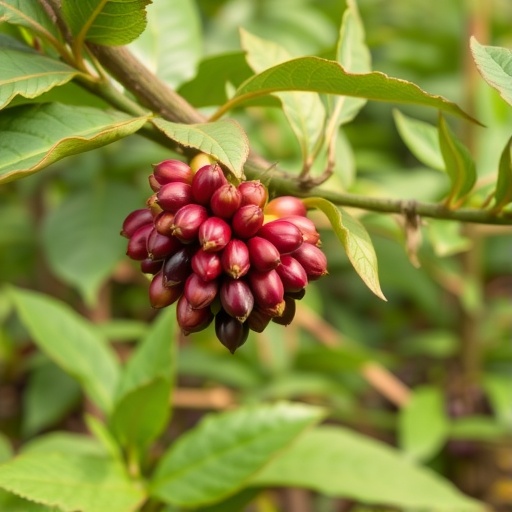In the picturesque landscapes of eastern Ethiopia, a significant shift in agricultural practices is unfurling, bringing with it profound implications for local economies, cultural identities, and environmental sustainability. The cultivation of khat, a plant with psychoactive properties, is on the rise, displacing traditional coffee farming. This transition raises essential questions about the socio-economic impacts on farm households and the broader implications for the agricultural sector in Ethiopia.
Khat, scientifically known as Catha edulis, has been a part of the Ethiopian cultural fabric for centuries, often consumed in social settings for its mild stimulant effects. Recently, as global coffee prices have fluctuated, many farmers have pivoted from coffee cultivation to khat farming. This transition is not merely economic; it is indicative of a more significant shift in how rural communities interact with their environment, engage in farming, and sustain their livelihoods.
The underlying reasons for this agricultural shift are multifaceted. On one hand, khat can yield higher returns compared to coffee, making it an economically attractive option for farmers. The rapid growth cycle of khat, which allows for multiple harvests within a year, contrasts sharply with the longer-term investment required for coffee cultivation. Thus, the allure of immediate financial benefits plays a critical role in this agricultural transformation.
Moreover, the supply chain dynamics surrounding khat production differ significantly from those of coffee. Coffee markets are heavily influenced by international prices, which can be volatile and beyond the control of local farmers. In contrast, the demand for khat is largely local and based on cultural consumption patterns, providing a more stable market. This relative stability empowers farmers by reducing their vulnerability to the fluctuations that characterize coffee prices.
However, this transition isn’t without its challenges. The social implications of shifting to khat cultivation are profound and multifaceted. While khat cultivation presents economic opportunities, it also raises concerns about public health and social well-being. The consumption of khat has been associated with various health issues, including psychological effects ranging from mild euphoria to agitation. Local health officials are increasingly spotlighting these concerns, urging communities to weigh the economic benefits against potential health risks.
Furthermore, this change in agricultural focus can have significant environmental ramifications. While khat is a hardy plant, its cultivation demands substantial water resources, raising potential issues for local water supplies. The idea of sustainable farming practices is more pressing than ever in Ethiopia, where water scarcity is becoming an increasingly critical issue. Addressing these environmental concerns during such a transformative period in agriculture will be crucial for the region’s long-term sustainability.
As farmers increasingly abandon coffee for khat, it is essential to examine how these transitions affect family dynamics and community structures. Coffee farming has long been a cornerstone of community identity in many Ethiopian regions, contributing not only to local economies but also to cultural heritage. The move towards khat cultivation could destabilize these traditional community ties, altering social relationships that have been built around coffee production.
The findings from recent farm household analyses shed light on these dynamics, providing rich insights into how this agricultural shift impacts livelihoods. The comprehensive research spearheaded by Abdurehim et al. underscores the necessity of understanding not only the economic implications but also the socio-cultural repercussions of changing agricultural practices in eastern Ethiopia. Their study emphasizes that such transitions do not exist in a vacuum; they are part of broader socio-economic trends that can redefine entire communities.
In considering the future of agriculture in eastern Ethiopia, it becomes evident that policymakers face a daunting challenge. They must balance the economic advantages of khat cultivation with the associated health risks and environmental concerns. Encouragingly, the research also suggests potential pathways to sustainable agricultural practices that can harmonize both traditional farming methods and modern economic opportunities.
To facilitate this balance, engaging local communities in decision-making processes is crucial. Farming families need access to education about the implications of their crop choices, helping them navigate the complexities of market demands, health considerations, and environmental sustainability. A more informed farming community is likely to engage in more sustainable practices, which can ultimately enhance resilience against economic shocks.
These insights point towards the need for further comprehensive research into the long-term impacts of khat cultivation. Ongoing studies could illuminate trends regarding agricultural practices, environmental sustainability, and community health outcomes. Research initiatives must be interdisciplinary, integrating views from agricultural scientists, economists, sociologists, and health professionals to provide a holistic understanding of these changes.
In conclusion, the metamorphosis from coffee to khat cultivation in eastern Ethiopia serves as a microcosm of broader global agricultural shifts. As communities embrace this change, the need for dialogue and cooperation among various stakeholders – farmers, local governments, health officials, and researchers – is paramount. Striking a balance between economic viability and social responsibility will define the future of agriculture in the region, determining not just the landscape of farming, but also the fabric of community life in eastern Ethiopia.
As the world watches this fascinating shift in agricultural dynamics, it stands as a testament to the complex interplay between culture, economy, and environment. The case of khat in Ethiopia reiterates that agricultural choices carry implications far beyond the fields, affecting livelihoods, health, and the environment. This ongoing transformation will continue to provide insights into the future of farming, sustainability, and community resilience.
Subject of Research: Agricultural Transition from Coffee to Khat Cultivation in Eastern Ethiopia
Article Title: Shifting from Coffee to Khat (Catha edulis) Cultivation in Eastern Ethiopia Provides Insights from a Farm Household Analysis
Article References:
Abdurehim, A.M., Mohammed, J.H., Edriss, A.K. et al. Shifting from coffee to khat (Catha edulis) cultivation in eastern Ethiopia provides insights from a farm household analysis.
Discov Sustain 6, 891 (2025). https://doi.org/10.1007/s43621-025-01773-x
Image Credits: AI Generated
DOI: 10.1007/s43621-025-01773-x
Keywords: Khat, Agricultural Transition, Ethiopia, Sustainable Practices, Farm Households, Economic Impacts, Community Health, Environmental Sustainability




